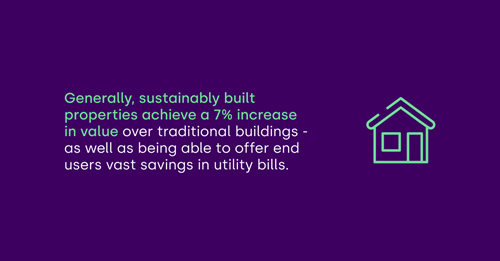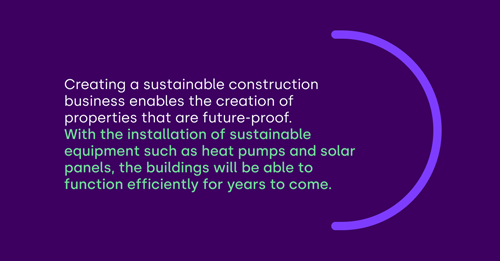Creating a sustainable construction business: what are the benefits?
Construction output in the UK costs more than £110bn per year and the industry accounts for almost 10% of total UK employment. Yet there are major obstacles to overcome relating to the industry’s sustainability rating.
Producing millions of metric tonnes of carbon dioxide emissions each year simply isn’t sustainable. Creating sustainable construction businesses is now essential in order for the UK to reach its legally binding Net Zero target by 2050.
So, what is a sustainable construction business and what are the benefits of building properties that utilise renewable materials and are made using renewable energy sources?
Making construction sustainable
Sustainable construction relates to building work that considers and prioritises the long-term effects of individual projects while ensuring the usage/extraction of materials has the least detrimental impact on people and the environment.
The end goal of any sustainable construction project will be to create an environmentally friendly building or built environment.
Examples of practices that a sustainable construction business may use include:
- Building with renewable and recyclable resources and materials
- Seeking to reduce energy consumption throughout each stage of a construction project
- Using renewable energy sources during construction
- Switching to greener alternatives such as Geopolymer cement or Hempcrete
- Considering the quality of life for construction workers, the end user and the surrounding community
The benefits of a sustainable construction business
-
Increase profit margins
Taking a sustainable approach to creating a construction business could save vast sums of money long-term. In terms of materials for your build, there is sometimes a perceived idea that sustainable materials are more expensive, however the cost of some items could quickly be offset with the increasing demands for sustainable infrastructure.
Using sustainable resources and renewable energy during construction projects, as well as constructing more green efficient buildings generally make it cheaper to maintain and operate for the end user. Buildings that are viewed as sustainable may be able to reap the advantage of having higher values and becoming an excellent return on investment. Two thirds of UK developers believe that sustainable design can add value to developments.
Many sustainable construction businesses also see a reduction in delays to projects which leads to further financial savings.
-
Reduce use of non-renewable energy sources and resources
Sustainable construction businesses can reduce their use of non-renewable energy sources by using an increasing number of alternative options. They will also need to focus on water conservation and energy efficiency throughout construction and for the end user.
Traditional resources such as concrete can be replaced by alternatives such as Hempcrete or other low carbon choices.
With concrete manufacturing alone responsible for approximately 5% of global carbon dioxide emissions, these simple switches could have a huge impact.
-
Increase durability and lifespan of properties
Creating a sustainable construction business enables the creation of long-lasting and well-built properties. With the installation of sustainable equipment such as heat pumps and solar panels, the buildings should be able to function efficiently for years to come.
-
Contribute to lower carbon emissions by using electric vehicles
Countries such as Finland have pledged to achieve 100% fossil fuel free construction sites by 2025, and there is pressure for the UK to follow suit.
To create fossil fuel free construction sites, businesses will need to look extensively at their current operations.
Sustainable construction businesses may seek to focus on investing in electric vehicles - either for the transportation of workers to and from sites or for the vehicles that deliver materials and resources.
-
Create sustainable homes that use energy efficient equipment
With the current energy crisis there has never been more demand for sustainable buildings which harness energy from renewable sources.
Generally, sustainably built properties achieve a 7% increase in value over traditional buildings - as well as being able to offer end users vast savings in utility bills.
Buyers are increasingly aware of the financial and environmental savings to be gained from equipment such as heat pumps with the emissions reductions that they enable.
Sustainable construction businesses that install energy saving equipment within their properties could demand higher prices and enjoy increased profits.

-
Grow your reputation as a sustainable construction business
At present there are only 500 net zero commercial buildings and 2000 net zero homes around the world. Yet green construction is set to be a key trend within the industry in the next decade.
As energy prices rise and buyers become ever more conscious of the products they’re consuming, there is a real demand for sustainable construction businesses who can deliver well built properties that don’t ‘cost the earth’.
Demonstrating a sense of Corporate Social Responsibility by operating in a sustainable way could help to reassure customers that they are making the right choice with a company that they can trust.

Improve quality of life for workers and end users
The construction industry has had a poor reputation for the workplace environment in which its workers operate.
Poor air quality (exacerbated by diesel engines on site) and heavy noise pollution have led to numerous health issues and increased absenteeism for construction workers for many years.
Creating a sustainable working environment could help to increase both productivity and morale which could make building more efficient and avoid delays and increased costs.
For end users such as tenants and homeowners, sustainable construction businesses could offer an exceptional quality of life with:
- Well designed developments with a focus on outdoor areas or green spaces
- Sustainably built homes finished with non toxic paints and carpets
- Communities that are engaged and supportive
- potential reduced levels of air pollution and better noise protection
Building a better future
Green construction is one of the three key growth markets focussed on by the government in its recent Construction 2025: Strategy and it’s clear that creating more sustainable construction businesses is essential.
Sustainable construction businesses make sense. Not only could they benefit from the opportunity to make strong profits and financial savings, they are also contributing to the fight against climate change and the need to invest in the future of the planet for the generations to come.

